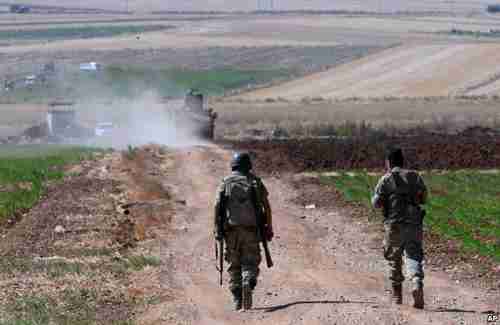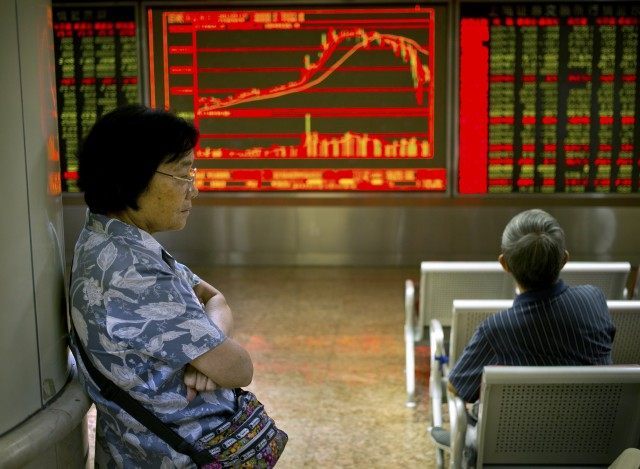This morning’s key headlines from GenerationalDynamics.com
- Turkey’s warplanes bomb ISIS and PKK strongholds in Syria
- Commodities and world trade plunge, signaling stock market decline
- China’s stock market partially ‘recovers’ after destruction
Turkey’s warplanes bomb ISIS and PKK strongholds in Syria

Turkish soldiers patrol near the border with Syria on Friday (AP)
Just a week ago, it was Turkey’s clearly stated policy to stay out of the war in Syria. But as we wrote yesterday in Syria’s war comes to Turkey after Monday’s terror attack on Suruç, Turkey no longer has any choice but to respond.
In a major policy reversal earlier this week, Turkey will let the US use Incirlik Air Base to fight the so-called Islamic State (IS or ISIS or ISIL or Daesh) in Syria, something that had been refused all along.
But perhaps the biggest change is that now Turkey’s warplanes will join the U.S.-led coalition airstrikes against ISIS targets in Syria. Turkey has already begun striking targets in Syria, but is doing so without violating Syria’s air space. Turkish officials did not rule out doing so in the future.
However, Turkey has taken on an even more ambitious task of airstrikes against both ISIS targets and Kurdish PKK targets in Syria. If I understand this correctly, Turkish warplanes will be striking at Kurdish militias in Syria, perhaps the same militias that are fighting against ISIS in Syria. This comes as Kurds in Turkey are accusing president Recep Tayyip Erdogan of allegedly helping ISIS in the fight over the Syrian city of Kobani. If Turkish warplanes are going to be striking Kurdish militias that are fighting ISIS, then those accusations are going to become much louder.
As of this week, Turkey is now embarking on an extremely dangerous course of action. Generational Dynamics predicts that the entire Mideast is headed for a major regional war, and that war seems to come much closer every week. AP and Anadolu Agency (Turkey) and Washington Post
Commodities and world trade plunge, signaling stock market decline
For the first time since the financial crisis of 2008, commodities and trade figures are signaling a warning for the global economy.
Gold has collapsed to five year lows. Copper just hit a six year low. Oil prices have had the worst price crash in 45 years. World trade volume has been declining sharply for five months.
Some analysts blame the plunge on the appreciating dollar and China’s failing economy. Whatever the reason, forecasts are that the trends will continue for the rest of the year. Analysts are mixed about the consequences, but with so many declining signals, a decline in US stocks of 30-50% would not be a surprise to some.

S&P 500 Price/Earnings ratio at astronomically high 21.18 on July 24 (WSJ)
Generational Dynamics predicts that we are headed for a global financial panic and crisis. According to Friday’s Wall Street Journal, the S&P 500 Price/Earnings index (stock valuations index) on Friday morning (July 24) was at an astronomically high 21.18. This is far above the historical average of 14, indicating that the stock market is in a huge bubble that could burst at any time. Generational Dynamics predicts that the P/E ratio will fall to the 5-6 range or lower, which is where it was as recently as 1982, resulting in a Dow Jones Industrial Average of 3000 or lower. Zero Hedge and Market Watch and Bloomberg
China’s stock market partially ‘recovers’ after destruction
As we reported several times, China’s Shanghai Composite stock market index peaked on June 12, and then plunged 30% in the next four weeks. It has now recovered about 1/4th of what it lost, because of extraordinary intervention by China’s government:
- China’s state-owned banks have lent a combined 1.3 trillion yuan (US$209 billion) to the China Securities Finance Corp (CSFC), an arm of the Chinese stock market regulator, to be used to purchase stock shares, in order to push up stock prices.
- State-owned or state-affiliated companies were forced to buy stock market shares, once again to push up prices. Industrial Bank, for instance, snapped up 9.9 billion yuan of its own shares.
- Trading was frozen on shares for hundreds of companies where the prices of the shares might have fallen. This tactic has not only prevented margin calls from being triggered; by limiting the supply of stocks that can be traded, it has boosted liquidity to the rest of the market.
The “China dream” is for China to replace the United States militarily, by taking control of the Pacific and Indian Oceans, and also to do so financially, by replacing the dollar with the Chinese yuan as the global reserve currency. In order to do that, China has to prove that it can provide a world-class stock market that can operate free of government information.
For that objective, the last month has been a disaster. China has effectively destroyed the Shanghai stock market as a market. China has absolutely no credibility left in its ability to provide a world-class stock market.
And that’s not the worst of it. Where is China going to go next? China has intervened massively to prop up an imploding bubble. China may have bought a few weeks’ time, but that bubble is going to implode, wrecking the savings of millions of ordinary people, often older people, who invested their life saving in the stock market when the bubble was growing. China has a history of massive “people’s rebellions” against an oppressive government. The last one was Mao’s Communist Revolution that ended in 1949. From the point of view of Generational Dynamics, China is now overdue for the next one. Quartz and Straits Times and Investors.com
KEYS: Generational Dynamics, Turkey, Recep Tayyip Erdogan, Kurds, Suruç, Islamic State / of Iraq and Syria/Sham/the Levant, IS, ISIS, ISIL, Daesh, Incirlik Air Base, Syria, Kobani, Kurdistan Workers’ Party, PKK, gold, copper, China, Shanghai, China Securities Finance Corp, CSFC, Industrial Bank
Permanent web link to this article
Receive daily World View columns by e-mail

COMMENTS
Please let us know if you're having issues with commenting.